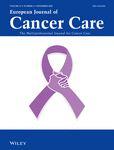Distress screening for patients with malignant diseases: Role in assuring psycho-oncological support
Funding information: The development and evaluation of the ePOS-screening is funded by German Cancer Aid (70114021).
Dear Editor,
In the recently published machine-learning study by Günther et al., nonperformed distress screening was identified as a central predictor for a lack of adequate psycho-oncological care. We too are convinced that distress screening is essential for the management of psycho-oncological care and would like to underline the authors' arguments with our findings.
Our electronic screening (ePOS) has been carried out at the Comprehensive Cancer Center Tübingen-Stuttgart, Germany, since 2010. All organ cancer centres have been connected since 2017. The evaluation of the data has been approved by the local ethics committee (783/2020BO2). We use the Hornheide Screening Instrument (Strittmatter et al., 2002) as distress measure to manage psycho-oncological care. We were able to collect complete data for n = 22,356 in almost 27,000 screenings carried out until 12/2021. About 29.6% of them shows distress requiring treatment. In the Distress Thermometer (n = 13,983), this is 50.6%. We also use PHQ-2 (n = 10,452) to screen for depression (15.0% suprathreshold) and GAD-2 (n = 8732) to screen for anxiety (17.8% suprathreshold). All measures suggest that, as hypothesised by the authors, the number of 15% of patients in contact with psychological–psychiatric care is well below need. In our two-stage screening, we explicitly ask patients ‘Do you currently need support in coping with the disease or psycho-oncological counselling?’ as a self-assessment (Schaeffeler et al., 2015; Teufel et al., 2014), which is 15.1% of n = 23,495 patients across all tumour entities and age groups affirm.
Günther et al. identified patients with skin cancer as risk group for not receiving appropriate psycho-oncological services. Filtering our screenings 24.3% of the patients in skin clinic (n = 8695) has an indication for psycho-oncological care according to the HSI. In this group, however, significantly fewer (6.3%) report a subjective need for themselves. This probably explains part of why the diagnosis of skin cancer was identified as a risk factor.
A second identified risk group is patients aged 65 and older at time of screening. About 26.9% of them reported an elevated distress in HSI, and 9.4% affirmed a subjective need. These proportions are higher for those younger than 64, with 31.2% overthreshold in the HSI and 18.5% with subjective need. This supports the hypothesis that younger patients will ask for support while older do less often. But we do not know if older patients possibly received other counselling instead.
A third risk group patients who do not have a psychiatric diagnosis have been identified. We do not have data on diagnosed mental illness but asked patients about current or former psychotherapy and/or psychiatric treatment. Out of n = 10,653 patients who answered, 8.8% were in in previous or current treatment. Of them, 47.6% are suprathreshold in HSI and 39.8% report a subjective need. The burden is indeed lower among those who did not report appropriate treatment but still suggests underuse: 28.3% have elevated scores in the HSI and 15.4% perceive a subjective need for treatment.
Unfortunately, we do not have evaluable data in the system on presentation in tumour boards or on the duration of inpatient treatment, the fourth and fifth groups on risk.
We agree with the authors that a screening used to steer psycho-oncological treatment pathways can significantly improve care—other services such as palliative care could also be included. However, we would also like to point out that not everyone who shows an elevated distress in the screening is actually in need of treatment for a wide variety of reasons (e.g. sufficient psychosocial support, priority of other issues, …). In our opinion, psycho-oncological distress screening can improve care even more effectively if it is combined with information about psycho-oncological services and involves patients in the decision-making process for or against such a professional support treatment as previously reported (Schäffeler et al., 2017).
ETHICS STATEMENT
The retrospective anonymised evaluation of the treatment data from the psycho-oncological screening was reviewed and approved by the responsible ethics committee.
CONFLICT OF INTEREST
The authors declare that they have no competing interest.
Open Research
DATA AVAILABILITY STATEMENT
The data that support the findings of this study are available from the corresponding author upon reasonable request.




